Ten of my favourite Waheeda Rehman songs
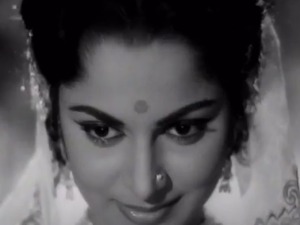 Waheeda Rehman! Just spelling out that name conjures a vision of great beauty for me. Beauty yes, but not coquette, not of a siren, very down to earth beauty, which radiates warmth. A smile, which brightens up your day. Grace, which mesmerises you. Eyes so expressive, that they could show a whole kaleidoscope of emotions and of a depth that one could lose oneself in it. An ethereal beauty! You would say how do a down-to-earth and ethereal go together. Well, that is what Waheeda Rehman is all about. Bringing together contradictions like truth always is. And truth is beautiful and divine. No wonder Guru Dutt sings and describes her a chaudhvin ka chaand (the full moon) in the film by the same name.
Waheeda Rehman! Just spelling out that name conjures a vision of great beauty for me. Beauty yes, but not coquette, not of a siren, very down to earth beauty, which radiates warmth. A smile, which brightens up your day. Grace, which mesmerises you. Eyes so expressive, that they could show a whole kaleidoscope of emotions and of a depth that one could lose oneself in it. An ethereal beauty! You would say how do a down-to-earth and ethereal go together. Well, that is what Waheeda Rehman is all about. Bringing together contradictions like truth always is. And truth is beautiful and divine. No wonder Guru Dutt sings and describes her a chaudhvin ka chaand (the full moon) in the film by the same name.
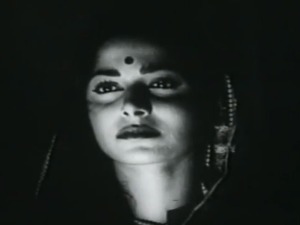
There was and is more to Waheeda than her beauty. A versatile actress, she proved her acting prowess again and again in different films. She showed their highs and lows, their dark and brighter sides, but what she gave them all was a human quality. A vulnerability, which made them connect to you. It might be the street smart hooker of Pyaasa or the career-oriented Rosie of Guide or the repentant Shanta waiting for her husband in Phagun. You could relate to all of them. You might not agree with them, but you could empathise with them.
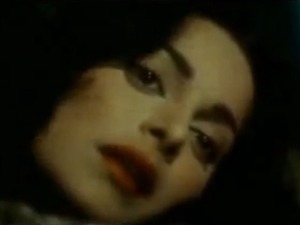
Choosing ten songs from her films was not easy. Thus I laid some criteria for choosing them.
a. The film must have her in a main role.
b. It must be a solo song
c. Waheeda must be lip-syncing to the song.
Dustedoff and Sunehriyaadein have already published a post of their favourite Waheeda Rehman songs and Anu of her favourite Waheeda roles. This post began as a comment at Sunehriyaadein’s post. Over the years it has changed indeed! Enjoy!
Read the rest of this entry »
Tags: aa aa bhi jaa raat dhalne lagi, Asha Bhosle, badle badle mere sarkar, Balkavi Bairagi, Chaudhvin Ka Chaand [1961], dev anand, Ek Dil Sau Afsane 1963], Guide [1965], guru dutt, Hasrat Jaipuri, Hemant Kumar, Jaidev, Lata Mangeshkar, Majrooh Sultanpuri, meri baat rahi mere man me, Mujhe Jeene Do [1963], My ten favourite Waheeda Rehman songs, Neeraj, o jaadugar pyaar ke ye bataa, Phagun [1973], piyaa tose nainaa laage re, Prem Pujari [1970], raat bhi hai kuchh bheegi bheegi, Raj Kapoor, rangeela re tere rang me, Ravi, Reshma Aur Shera [1972], Roop Ki Rani Choron Ka Raja [1961], S. D. Burman, Sahib Bibi Aur Ghulam [1962], Sahir Ludhianvi, sandhya jo aaye man ud jaaye, Shailendra, Shakeel Badayuni, Shankar-Jaikishan, Sunil Dutt, Teesri Kasam [1967], tu chanda maina chandani, tum to dil ke taar chhed kar, Waheeda Rehman
My ten favourite Meena Kumari songs
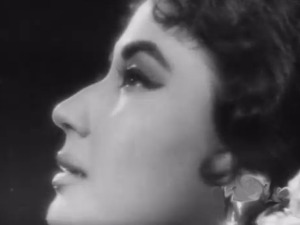
Meena Kumari, a face, which launched thousand tragic films. A thousand might be a bit of exaggeration, but she alone on her star-power helped tragic films to great success. In the 50s and even in the frolicking, colourful 60s, people would flock the cinema halls (to different degrees) to see her suffer. She was also an adept comedienne, in which she also excelled and was quite successful as seen in Magroor [1950], Miss Mary [1957], Azaad [1955] and Kohinoor [1960].
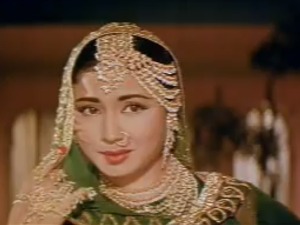
Meena Kumari at a certain time in my childhood played a big role in shaping the image of women in my psyche. Exposed to a slew of films, where she played a neglected wife, a suffering daughter-in-law, a sacrificing daughter, a caring sister-in-law, a protective sister or ‘simply’ a tormented woman between two men, she moulded an image of women being forever doomed to suffer at the hands of men in life. It is true that even other leading ladies like Mala Sinha (Anpadh) or Nutan (Khandan, Chhota Bhai) played such roles but it was as if they were impersonating Meena Kumari in these films. Meena Kumari remained always the original and the one to which others had to match to.
The presence of strong, independent and liberal women in my family and surroundings though would rectify the image in my mind; Meena Kumari would nevertheless always remain special.
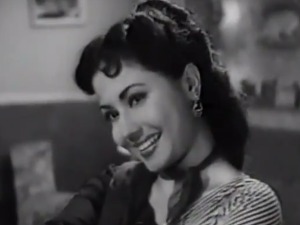
On 31st March it was her 41st death anniversary. To commemorate it here are ten of my favourite songs filmed on her. Read the rest of this entry »
Tags: 31st March, 41st death anniversary, aaj ham apni duaon ka asar dekhenge, aaj to meri hansi, ajeeb dastan hai yeh, Akeli Mat Jaiyo [1963], Asha Bhosle, Ashok Kumar, Bahu Begum [1967, Baiju Bawra [1952], C Ramchandra, chalo dildaar chalo, chalte chalte, Chitralekha [1964], Dil Apna Aur Preet Parai [1960], Dil Ek Mandir [1963], duniya kare sawaal to ham kya jawab de, Durga Khote, Edwina Violette, Geeta Dutt, Ghulam Mohammad, Gomti Ke Kinare [1972], ham tere pyar me saara aalam, Hasrat Jaipuri, Hemant Kumar, inhi logon ne, Kaajal [1965], Kamal Amrohi, kitni jawan hai raa tkoi yaad aa gaya - Azaad [1955], Lata Mangeshkar, Madan Mohan, Majrooh Sultanpuri, mausam hai aashiqana, Meena Kumari, mohe bhool gaye sanwariya, My ten favourite Meena Kumari songs, Nadira, Naushad, Pakeezah [1972], piya aiso jiya me samay gayo re, Raaj Kumar, Rajendra Krishna, Rajendra Kumar, Ravi, Roshan, Sahib Bibi Aur Ghulam [1962], Sahir, Sahir Ludhianvi, sansar se bhaage phirte ho, Sawan Kumar Tak, Shailendra, Shakeel Badayuni, Shanker-Jaikishan, thade rahiyon, tora man darpan kehlaye, woh jo milte the kabhi
Arunji, whose anecdotes and memories of the good old times we adore and whose filmi knowledge, we admire, springs in the arena once again to fill up the empty time space here. Thank you Arunji! Without much ado, I pass the mike to him.
Arunkumar Deshmukh’s ten favourite inspired song-pairs
EK DIL DO JAANE- EK TUNE DO GAANE
The other day I was reading a book in my Drawing Room,when I heard my college going grandson telling a small boy,” you don’t know,but in our times,things were not like this…”
I smiled. Every generation thinks that their times were better that the present one.
I wondered whether if I tell today’s children that in my college days,Petrol was costing only 5 Rupees a Gallon (around 3.7 Litres) or that a car driver could be hired on a salary of Rs.150 pm, will they believe it ? We never believed when our elders told us that Gold was bought by them at 10 Rs. a Tola (about 11.4 Gms.),because at the time of my marriage Gold was costing 150 rupees per Tola(about 11.4 gms).Today when Gold has crossed the barrier of rs.30000 for just 10 gms,these stories look like Arabian Night stories,indeed !!
Sometimes I keep thinking if old times were better or the present times are better.I have not been able to come to any conclusion so far.
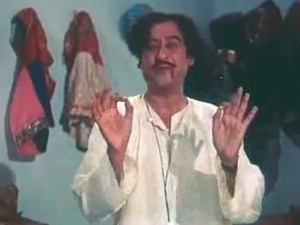 Read the rest of this entry »
Read the rest of this entry »
Tags: Aa jao tumhe dil ka, Aakhri Dao [1958], Aankhon se jo utari hai dil mein, Anand Bakshi, Anil Biswas, Anjum Pilibhiti, Anmol Ghadi [1946], Arun Deshmukh, Arun Deshmukh’s ten favourite inspired song-pairs, Arzoo [1965], Asha Bhosle, Aye phoolon ki raanee, B R Sharma, Chunariya [1948], De di hamen Azaadi, Dharamputra [1961], Didi [1948], Dil e naashaad ko jeene ki hasrat, Dil jalta hai to jalne de, Dr.Safdar 'Aah', Ek phool do Maali [1969], Guest Post, Hamee se muhabbat hamee se Ladai, Hansraj Behl, Hasrat Jaipuri, Heer [1956], Hemant Kumar, Jaadoo [1951], Jagriti [1954], Jeevan Mrityu [1970], Kavi Pradeep, Kiska deep Jalta hai, Kya mil gaya Bhagwan, Lata Mangeshkar, Laxmikant-Pyarelal, Leader (1964), Madan Mohan, Main jab bhi akeli hoti hoon, Majrooh Sultanpuri, Mamta [1966], Manna Dey, Mitti Me Sona [1960], Mohd. Rafi, Mukesh, Mukund Masurekar, N.Datta, Naadan muhabbat walon ke, Naujawan [1951], Naushad, Naya Daur [1957], Noorjehan. Dil leke daga denge, O. P. Nayyar, Pehli nazar [1945], Phir milogi kabhi, Phir Wohi Dil Laya Hoon [1963], Poocho na hamein, Prem Dhawan, Rahen na rahen hum, Raja Mehdi Ali Khan, Ravi, Roshan, S. D. Burman, S. H. Bihari, Sahir Ludhianvi, Saraswati Kumar Deepak, Shakeel Badayuni, Shanker Das Gupta, Shanker-Jaikishen, Thandi hawayen, Vo chaand muskuraya, Yeh parda hataa do, Yeh Raat Phir Na Aayegi [1966], Zamane mein aji kai aise naadan
My ten favourite kaun aayaa songs
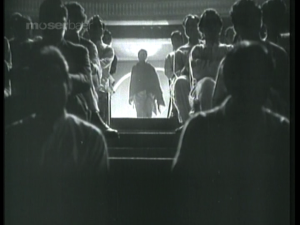
I’m sure it must have happened to you as well. Sometimes you meet a person and the mere presence of this man/woman makes you feel good. You need not talk about overtly intelligent topics. You might not laugh heartily, but just being in the presence of that particular person makes you feel wonderful. It makes you feel as if you have experienced inner growth. Few days back, I again had such an experience, where I was left wondering: What was that? I was so elated, that I posted the song yeh aaj meri zindagi me kaun aa gaya on a forum I frequent, which gave me the idea for this post.
Unlike my last experience, the encounters making the characters of Hindi film exclaim “yeh kaun aayaa” are mostly of romantic nature. Some feel that spring has come, while others feel the moon has risen. Everybody has his or her own of exclaiming and rejoicing in this emotion. I personally think that a good song can convey more than the words themselves. So, enjoy my ten favourite kaun aayaa songs and tell me about yours.
Read the rest of this entry »
Tags: Anand Bakshi, Anoop Kumar, Asha Bhosle, Asha Parekh, Baazi [1951], Deepti Naval, Dekh Kabira Roya [1957], dekho yeh kaun aayaa, Dil Deke Dekho [1959], Farooque Sheikh, Geeta Dutt, imi Garewal, Imtihaan [1974], Indu Jain, Jawani Diwani [1972], Jaya Bhaduri, Kalpana Karthik, Katha [1983], kaun aayaa kaun aayaa, kaun aayaa ki nigahon me chamak jaag uthi, kaun aayaa mere man ke dwaare, kaun yeh aayaa mehfil me, Kishore Kumar, Lata Mangeshkar, Laxmikant-Pyarelal, Look who’s here!, Madan Mohan, Majrooh Sultanpuri, Manna Dey, Mohd. Rafi & Usha Khanna, Munshi Aarzoo, my ten favourite kaun aayaa songs, Nartaki [1939], Naseeruddin Shah, Naushad, Pankaj Mullick, Poonam Dhillon, R. D. Burman, Raaj Kumar, Raj Kamal, Rajendra Krishan, Rajendra Kumar, Randhir Kapoor, Ravi, rosha maati, roz shaam aati magar aisi na thi, S. D. Burman, saamne ye kaun aayaa dil me huyi hulchal, Saathi [1968], Sadhana, Sahir Ludhianvi, Savere Wali Gaadi [1986], Shakeel Badayuni, Shammi Kapoor, Sunny Deol, Suresh Wadkar & Asha Bhosle, tambadi maati, Tanuja, Usha Khanna, Vinod Khanna, Waqt [1965], yeh kaun aaj aayaa sawere sawere, yeh kaun aayaa, yeh kaun aayaa ke mere dil ki duniya me bahaar aayi, yeh kaun aayaa roshan ho gayi mehfil kisake naam se
-
Seeing no new post from me on my blog, my readers got concerned about it. Pacifist just couldn’t tolerate this utter neglect and came again to my rescue. thank you, dear Pacifist. This is her third post on this blog and with it she is showing her business acumen. Bravo, Pacifist! More power to the small businessmen and -women!
Pacifist’s choice of 10 songs of small business
Thank you Harvey. I’m quite pleased at having this opportunity of posting 10 songs on a subject I have often thought about. People selling stuff, doing business. It was a wonderful time of economic opportunity, letting the small fish survive. Today they have been eaten up by the big fish. I don’t mean to imply that they all sold stuff in the filmi manner, but sell, they did.
So in memory of those small dying/dead businesses, here are 10 such songs.
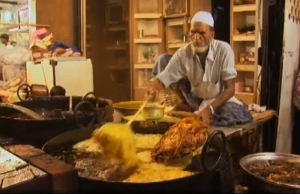
I do have more than 10 songs with a different product being sung and sold, but I’m such a sucker for melody, tunes which are pleasing to my ears that I left some and took some even though the product got repeated. Boot Polish was one such, Tel Maalish another 🙂
Read the rest of this entry »
Tags: aaj ki taaza khabar, Asha Bhonsle, baman ho ya jaat, Bhagwaan, boot chappal sandal- Karigar (1958), C Ramchandra, channa chor garam babu, Chitragupt, dev anand, Dhumal, ek aana boot polish do aana tel maalish, Film Pyaasa (1957), Ghar ki Laaj (1960), Guest Post, Jaan Nissar Akhtar, Jadoo [1951], Johnny Walker, Kabhi Andhera Kabhi Ujala (1958), Karigar (1958), Kishore Kumar, lelo choodiyan main laya nirali, lelo lelo do phool jani lelo, Majrooh Sultanpuri, Maya [1961], Meena Kumari, Mohammad Rafi, Mukesh, Nalini Jaywant, Naushad, Naya Andaaz (1956), O. P. Nayyar, OP Nayyar, Pacifist, Prem Dhawan, Rajendra Krishan, Ravi, Sahir Ludhianvi, Sajid Khan, Salil Choudhary, sar jo tera chakraye, SD Burman, Shakeel Badayuni, Shamshad Begum, Shanti Mathur, Sheikh Mukhtar, Son of India (1962), surma mera nirala, Tel Maalish Boot Polish (1961), This Singing Business, Usha Mangeshkar, zindagi hai kya, Zorabai
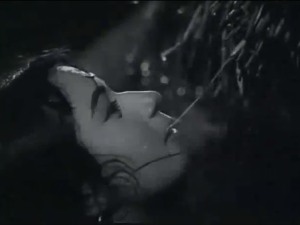 Today, on the occasion of Nanda’s birthday, here is a different kind of post; Nanda and her eight different voices. If you were a leading actress in the 60s and 70s, like Nanda, you could spend your entire career without having had lip-synced to anybody but Lata and Asha’s voice. Since Lata had that tiff with Rafi, it could be possible that Suman Kalyanpur also lent her voice to you in a duet with him. Thus, it is amazing to see that Nanda moved her lips to eight singers in her short career.
Today, on the occasion of Nanda’s birthday, here is a different kind of post; Nanda and her eight different voices. If you were a leading actress in the 60s and 70s, like Nanda, you could spend your entire career without having had lip-synced to anybody but Lata and Asha’s voice. Since Lata had that tiff with Rafi, it could be possible that Suman Kalyanpur also lent her voice to you in a duet with him. Thus, it is amazing to see that Nanda moved her lips to eight singers in her short career.
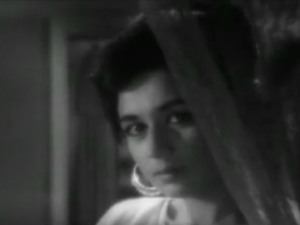 Today is also Madhu-Dustedoff’s birthday. So here is to both of your birthdays!! Read the rest of this entry »
Today is also Madhu-Dustedoff’s birthday. So here is to both of your birthdays!! Read the rest of this entry »
Tags: Agra Road [1957], Akashdeep [1965], Asha Bhosle, betaab nigahon se mujhe dekhne walo, Chhalia [1973], Chitragupta, Dustedoff’s birthday, Geeta Dutt, Gumnaam [1965], gunahao ka chirag jal na sakega, Hasrat Jaipuri, jaan-e-chaman shola badan, Kala Bazaar [1960], Khaiyyam, Lata Mangeshkar, Leela Chitnis, Majrooh Sultanpuri, mile to phir jhuke nahin, Mohabbat Isko Kahete Hain [1965], Mohd. Rafi, Mukesh, na main dhan chahoon, Nanda's eight voices, Nanda’s birthday, Nartaki [1963], Navin Nischol, pike ham tum jo chale, Prem Dhawan, R. D. Burman, Rajinder Krishan, Ravi, Roshan, S. D. Burman, Shailendra, Shakeel Badayuni, Shankar-Jaikishan, Sharda, Shashi Kapoor, Sudha Malhotra, Suman Kalyanpur, Sunil Dutt, theriye hosh me aa loo, Usha Mangeshkar, Vani Jairam, zindagi me aap aaye
My ten favourite Sadhana songs

Today on your 71st birthday, wish you a happy birthday and many more to come, dear Sadhana! Thanks for the beautiful films and moments, which you have gifted us!
Sadhana, one of the Hindi screen’s beautiful leading ladies. She was a trend-setter in fashion, when nobody even knew this word. She was glamorous, beautiful and more importantly talented actress. Given the trend of the 60s, where the frothy musicals reigned supreme, she got ample scope to show her acting talents in variety of films. Bimal Roy, the ace-director cast her in Parakh (1960) and Prem Patra (1964). Raj Khosla made a trilogy of films with her in central roles Woh Kaun Thi? (1964), Mera Saaya (1966) and Anita (1967).

Her thyroid problem led to an eye ailment, which led to her going on a long treatment in the USA, due to which she was missed on many films. Her come-back films were Intequam (1969) and Ek Phool Do Mali (1969) were hits. The 70s even saw her don the cap of the director for Geeta Mera Naam (1974). The changing trends of the 70s saw her take retirement from the silver screen, though the 70s saw the release of delayed films like Amanat (1975), Vandana (1975) and Mehfil (1981). Her last film Ulfat ki Nayi Manzilein, whose music was released in 1968, got released in 1994. In the song here, we see how the film must have been completed with doubles, in the song, baharon se kahenge nazaroon se kahenge, we see only the back of the character played by her.

I have chosen only solo songs from her films and I have restricted myself to one song pro film.
Enjoy!
Read the rest of this entry »
Tags: aap ki inayaten aap ke karam, Ajay Sahni, Anand Bakshi, Anita [1967], Asad Bhopali, Asha Bhosle, Asli Naqli [1962], Bimal Roy, Biswajeet, dev anand, Dharmendra, Ek Phool Do Mali, Feroz Khan, Geeta Mera Naam [1974], guru dutt, hamne jin ke khwab sajaye, Happy Birthday Sadhana!, Hrishikesh Mukherjee, hum khoob jante hai, Ishq Par Zor Nahin [1970], kareeb aa yeh nazar phir mile, kaun aaya ki nigaahon me chamak jaag uthi, Kishore Kumar naina barse rimjhim rimjhim, kitna rangeen hai ye chaand sitaaron ka samaa, Lata Mangeshkar, Laxmikant-Pyarelal, Madan Mohan, main to tum sang nain milake haar gayi sajana, Manmauji [1962], Manoj Kumar, Mera Saaya [1966], My ten favourite Sadhana songs, Naaz, naino me badra chahe, o mere bairaagi bhanwara, o sajana barkha bahaar aayi, Parakh [1960], Parikshit Sahni, Picnic, Raaj Kumar, Raja Mehdi Ali Khan, Rajinder Krishan, Ravi, S. D. Burman, Saajan Ki Galiyan, Sahir, Salil Chowdhury, Shailendra, Shankar-Jaikishan, Sunil Dutt, suniye zara dekhiye na, tera mera pyar amar, Vandana [1975], Waqt [1965], Woh Kaun Thi [1964], Zaheeda
My ten favourite Nutan romantic-duets
 Comes 4th of June and it is Nutan’s birth anniversary again and also that of bollwood deewana and Richard’S sister. It is turning fast into a tradition to celebrate Nutan’s birthday on this blog. This is her third birthday here. Last year I listed my favourite solo songs of hers. This year it is the turn of duets.
Comes 4th of June and it is Nutan’s birth anniversary again and also that of bollwood deewana and Richard’S sister. It is turning fast into a tradition to celebrate Nutan’s birthday on this blog. This is her third birthday here. Last year I listed my favourite solo songs of hers. This year it is the turn of duets.
 As usual I have taken only one duet per film. What really surprised me was that in her three most famous films, Seema [1955], Sujata [1959] and Bandini [1963], she doesn’t have any duets with her love interest! They are also missing in her Nagina [1951] and Hum Log [1951].
As usual I have taken only one duet per film. What really surprised me was that in her three most famous films, Seema [1955], Sujata [1959] and Bandini [1963], she doesn’t have any duets with her love interest! They are also missing in her Nagina [1951] and Hum Log [1951].
Well, here are my favourite Nutan duets. Enjoy them!
Read the rest of this entry »
Tags: . Dekho Rootha Naa Karo, 4th of June, Aasmanwale Teri Duniya Se Jee, Ae Chaand Zaraa Chhup Jaa, Ae Kaash Chalte Milke, Anil Biswas, Asha Bhosle, Basant [1960], Bharat Bhushan, Chhod Do Aanchal, Chori Chori Ek Ishara, chupke se mile pyaase, dev anand, Dil Hi To Hai [1963], Dilli Ka Thug [1958], Geeta Dutt, Ghulam Mohammad, Hasrat Jaipuri, Heer [1956], Hemant Kumar, Kishore Kumar, Laatsaab (1967), Laila Majnu [1953], Lata Mangeshkar, Majrooh Sultanpuri, Man Ki Been Matwari Baaje, Manna Dey, Manzil [1960], Mohd. Rafi, Mukesh, my ten favourite Nutan romantic-duets, Naushad, Nutan's birth anniversary, Nutan’s birthday, O Saajana Chhuta Hai Jo Daaman Tera, O. P. Nayyar, Paying Guest [1957], Pradeep Kumar, Qamar Jalalabadi, Raj Kapoor, Ravi, Roshan, S. D. Burman, Sahir Ludhianvi, Shabab [1954], Shailendra, Shakeel Badayuni, Shammi Kapoor, Shankar-Jaikishan, Talat Mehmood, Tere Ghar Ke Saamne [1963], Tumhari Mast Nazar Gar Idhar Nahin Hoti, Yeh Raatein Yeh Mausam
First of all I would like to thank everybody for their good wishes to my/our blog on its birthday.
The quiz got a nice response. Shashi and Samir sent me the answers the very next day. They had some sophisticated techniques to get to the answers. Samir in his feedback to the quiz elaborated on it. Samir, would you be so kind to post it also in the comments section below? It is very enlightening!
Lalitha was very industrious and worked till the last hour and sent me her answer four hours back.
Totally eight persons sent me their answers and it was fun going through them. Lomo and Andi were new for me. They told me that they usually read my posts and the comments by the readers and that they enjoy it a lot and at times more the comments than the post itself (so says Andi).
Here are the scores
Archana = 128,5
Pacifist = 126
Shashi = 124
Samir = 106
Lomo = 100
Lalitha = 93
Andi = 93
Anu = 55
Congratulations Archana for scoring the most points and thanks to all participants! The email communication with you regarding the hints and clues was a source of great pleasure for me!
Well, here are the answers! Read the rest of this entry »
Tags: 5 Rifles, Aaj Yeh Meri Zindagi, Aar-Paar, Abhi To Haath Me Jaam Hai, Ambika Johar, Amitabh Bachchan, Anand Bakshi, Anjaan, Asha Bhosle, Aziz Nazan, Bappi Lahiri, Chandan Ka Palna [1967], Chhod Mera Haath Mujhe Peene De, dev anand, Dharamendra, Dil Hi To Hai [1963], former Miss India, Geeta Dutt, happy God, Hasrat Jaipuri, Hoon Abhi Main Jawan Ae Dil, Hum Hain Nashe Mein, Jhoom Bharabar Jhoom Sharabi, Kishore Kumar, Lata Mangeshkar, Laxmikant-Pyarelal, Leela Naidu, Madan Mohan, Mahjabeen, maid of jerky movements, Majrooh Sultanpuri, Manna Dey, Meena Kumari, Mohd. Rafi, Mujhe Le Chalo, Mukesh, Namak Halal, Naza Sholapuri, Nutan, O. P. Nayyar, R. D. Burman, Raj Kapoor, Rajinder Krishan, Rakesh Khanna, Ramlal, Ravi, Roshan, Sahir Ludhianvi, Sandhya, Seeta aur Geeta [1972], Sehra [1963], Shahi Kapoor, Shakila, Sharaabi, sharabi sharabi mera naam ho gaya, Subah-O-Sham [1972], the illustrious one, Thodi Si Jo Pee Li Hai, Tumhari Mast Nazar, Waheeda Rehman, Yeh Raaste Hai Pyar Ke
My ten favourite Asha-Lata duets
Happy Women’s Day! Today on the occasion of Women’s day, I would like to focus on two ladies, who have influenced Indian cinema in a way, which hardly anybody has done till now. The two ladies in question are Lata Mangeshkar and Asha Bhosle.

(by Gautam Rajadhyaksha, from: http://forbesindia.com/slideshow-big/recliner/gautam-rajadhyaksha-the-pharaoh-of-faces/28732/1)
Lata Mangeshkar and Asha Bhosle dominated the female playback singing in the Hindi film industry from the 50s to the 80s. Their art and artistry still influences the singing of the female singers in India. Each of them has allegedly sung more than 4000 songs, but it is said that they recorded only 75 songs (duets, trios, and quartets) together in Hindi films. Their first duet was recorded for the film Daman [1951] under the baton of K. Dutta and the song was ye ruki ruki hawaiyen.

(from: http://withfriendship.com/user/neeraj/Asha_Bhosle.php)
While Lata has that virginal, untouched, sweet voice, there is this dark, seductive tone of Asha’s. For me Lata’s voice is like a thandi hawa, which refreshes and cools, while Asha’s voice is one which though it might be outwardly calm brings a whirlwind bringing all my feelings and emotions in a chaos. What really strikes me about Asha’s voice is her phenomenal width. She seems to go from one octave to the other like a lift and bridge it with a effortlessness, which takes my breath away. Both of them have a phenomenal technique, which has assured them a long career.
Making a 10 favourite list for Lata or Asha is a futile task. I won’t even attempt it, thus I have taken an easier way out and listed my ten favourite Asha-Lata duets. In the duets their rivalry or let us say healthy competition can be seen in how the lines of the song are divided among them. It is also interesting to note that if the duet was between the leading lady and her friend, then Lata always gave playback to the heroine and Asha got to sing for the sakhi.
I will stop analysing and present my ten favs. Hope you like and enjoy them.
Read the rest of this entry »
Tags: Aaye Din Bahar Ke [1966], Ae Kaash Kisi Diwane Ko, Aji Chale Aao, Anand Bakshi, Aruna Irani, Asha Bhosle, Asha Parekh, Bahu Begum [1967, Basant Bahar [1956], Bela Bose, Bharosa [1963], Chanchal, Daman [1951], Dhadhkaa O Dil Dhadhkaa, Halaku [1956], Happy Women’s Day! Lata Mangeshkar, Hasrat Jaipuri, Helen, Hemant Kumar, Jab Jab Tumhe bhulaya, Jabse Laagi Tose Najariya, Jahan Ara [1964], Jamuna, Jis Desh Mein Ganga Behti Hai [1960], K. Dutta, Kar Gaya Re Kar Gaya Mujh Pe Jadoo, Kum Kum, Kya Hua Yeh Mujhe Kya Hua, Laxmikant-Pyarelal, Madan Mohan, Man Kyo Beheka Ri Beheka, Meena Kumari, Minoo Mumtaz, Miss Mary [1957], My ten favourite Asha-Lata duets, Nazima, Nimmi, Pad Gaye Jhoole, Padmini, Rajinder Krishan, Ravi, Roshan, Sahir, Sai, Sakhi Ri Sun Bole, Shailendra, Shankar-Jaikishan, Shikar [1968], Subbulaxmi, Utsav [1984], Vasant Dev, ye ruki ruki si hawaiyen, Zeb Rehman
 Waheeda Rehman! Just spelling out that name conjures a vision of great beauty for me. Beauty yes, but not coquette, not of a siren, very down to earth beauty, which radiates warmth. A smile, which brightens up your day. Grace, which mesmerises you. Eyes so expressive, that they could show a whole kaleidoscope of emotions and of a depth that one could lose oneself in it. An ethereal beauty! You would say how do a down-to-earth and ethereal go together. Well, that is what Waheeda Rehman is all about. Bringing together contradictions like truth always is. And truth is beautiful and divine. No wonder Guru Dutt sings and describes her a chaudhvin ka chaand (the full moon) in the film by the same name.
Waheeda Rehman! Just spelling out that name conjures a vision of great beauty for me. Beauty yes, but not coquette, not of a siren, very down to earth beauty, which radiates warmth. A smile, which brightens up your day. Grace, which mesmerises you. Eyes so expressive, that they could show a whole kaleidoscope of emotions and of a depth that one could lose oneself in it. An ethereal beauty! You would say how do a down-to-earth and ethereal go together. Well, that is what Waheeda Rehman is all about. Bringing together contradictions like truth always is. And truth is beautiful and divine. No wonder Guru Dutt sings and describes her a chaudhvin ka chaand (the full moon) in the film by the same name.




 Read the rest of this entry »
Read the rest of this entry »
 Today, on the occasion of Nanda’s birthday, here is a different kind of post; Nanda and her eight different voices. If you were a leading actress in the 60s and 70s, like Nanda, you could spend your entire career without having had lip-synced to anybody but Lata and Asha’s voice. Since Lata had that tiff with Rafi, it could be possible that Suman Kalyanpur also lent her voice to you in a duet with him. Thus, it is amazing to see that Nanda moved her lips to eight singers in her short career.
Today, on the occasion of Nanda’s birthday, here is a different kind of post; Nanda and her eight different voices. If you were a leading actress in the 60s and 70s, like Nanda, you could spend your entire career without having had lip-synced to anybody but Lata and Asha’s voice. Since Lata had that tiff with Rafi, it could be possible that Suman Kalyanpur also lent her voice to you in a duet with him. Thus, it is amazing to see that Nanda moved her lips to eight singers in her short career. Today is also Madhu-Dustedoff’s birthday. So here is to both of your birthdays!! Read the rest of this entry »
Today is also Madhu-Dustedoff’s birthday. So here is to both of your birthdays!! Read the rest of this entry »






